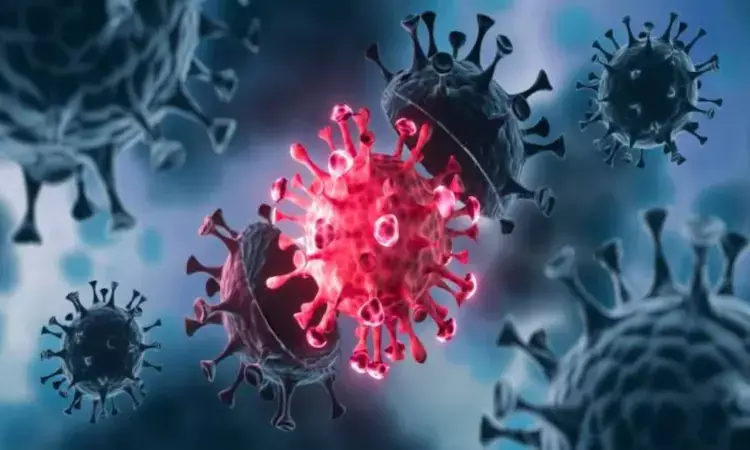- Home
- Medical news & Guidelines
- Anesthesiology
- Cardiology and CTVS
- Critical Care
- Dentistry
- Dermatology
- Diabetes and Endocrinology
- ENT
- Gastroenterology
- Medicine
- Nephrology
- Neurology
- Obstretics-Gynaecology
- Oncology
- Ophthalmology
- Orthopaedics
- Pediatrics-Neonatology
- Psychiatry
- Pulmonology
- Radiology
- Surgery
- Urology
- Laboratory Medicine
- Diet
- Nursing
- Paramedical
- Physiotherapy
- Health news
- Fact Check
- Bone Health Fact Check
- Brain Health Fact Check
- Cancer Related Fact Check
- Child Care Fact Check
- Dental and oral health fact check
- Diabetes and metabolic health fact check
- Diet and Nutrition Fact Check
- Eye and ENT Care Fact Check
- Fitness fact check
- Gut health fact check
- Heart health fact check
- Kidney health fact check
- Medical education fact check
- Men's health fact check
- Respiratory fact check
- Skin and hair care fact check
- Vaccine and Immunization fact check
- Women's health fact check
- AYUSH
- State News
- Andaman and Nicobar Islands
- Andhra Pradesh
- Arunachal Pradesh
- Assam
- Bihar
- Chandigarh
- Chattisgarh
- Dadra and Nagar Haveli
- Daman and Diu
- Delhi
- Goa
- Gujarat
- Haryana
- Himachal Pradesh
- Jammu & Kashmir
- Jharkhand
- Karnataka
- Kerala
- Ladakh
- Lakshadweep
- Madhya Pradesh
- Maharashtra
- Manipur
- Meghalaya
- Mizoram
- Nagaland
- Odisha
- Puducherry
- Punjab
- Rajasthan
- Sikkim
- Tamil Nadu
- Telangana
- Tripura
- Uttar Pradesh
- Uttrakhand
- West Bengal
- Medical Education
- Industry
Cases of new COVID variant causing itchy eyes in children on rise in India

New Delhi: A new report has stated that a new COVID-19 variant may cause previously unseen symptoms in children, which recently landed on the WHO's (World Health Organization) radar.
Government data showed that India recorded nearly 6,000 new cases on 9th April 2023. The active case count was 35,000. The surge is largely driven by XBB.1.16, an omicron subvariant. The WHO has said it was watching the subvariant and the spread in India. According to the experts, it's not known to be lethal.
Two hundred thirty-four cases of XBB1.16.1 mutated sub-variant were found in the country amid a spurt in fresh COVID-19 cases.
The BBC reported that to check the hospital's preparedness to deal with rising cases of COVID-19, India's health ministry is conducting mock drills. Although India's active case count is relatively low, experts are urging caution to prevent further disease spread.
A deadly second wave was seen in India in 2021, and the government came under criticism as many hospitals ran out of oxygen and critical care beds. During that time, sickened people were seen lying on sidewalks outside overflowing hospitals, and reports surfaced of a black market for private citizens to buy oxygen.
According to the Indian SARS-CoV-2 Genomics Consortium (INSACOG) data, 1,774 cases of the new variant have been found across 22 states and Union Territories.
According to the Times of India, while the variant, called "Arcturus," hasn't yet made the CDC's watchlist, a prominent paediatrician in India is seeing children with "itchy" or "sticky" eyes as if they have conjunctivitis or pinkeye.
Vipin Vashishtha, MD, said on Twitter that the new itchy eye symptom is in addition to kids having a cough and high fever. He noted that pediatric COVID cases have picked up there for the first time in 6 months.
The Times of India reported that India has also seen an increase in another virus in children with similar symptoms, called adenovirus. COVID and adenovirus cannot be differentiated without testing, and because swabs are uncomfortable, parents resist testing their children.
One doctor told the TOI that among every ten kids with COVID-like symptoms, two or three had tested positive on a COVID test taken at home.
Arcturus (formally, Omicron subvariant XBB.1.16) made news two weeks ago as it landed on the WHO's radar after surfacing in India. A WHO official called it "one to watch." The Times of India reported that 234 new XBB.1.16 were included in the country's latest 5,676 new infections, meaning the subvariant accounts for 4% of new COVID cases.
Dr Kamal Kant Kohli-MBBS, DTCD- a chest specialist with more than 30 years of practice and a flair for writing clinical articles, Dr Kamal Kant Kohli joined Medical Dialogues as a Chief Editor of Medical News. Besides writing articles, as an editor, he proofreads and verifies all the medical content published on Medical Dialogues including those coming from journals, studies,medical conferences,guidelines etc. Email: drkohli@medicaldialogues.in. Contact no. 011-43720751


